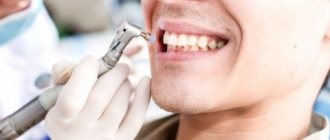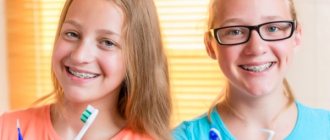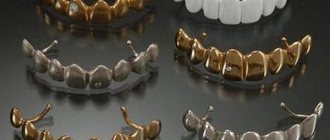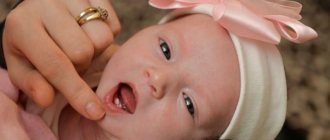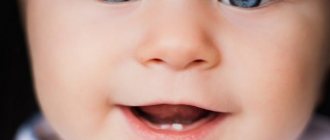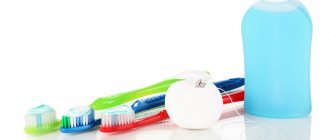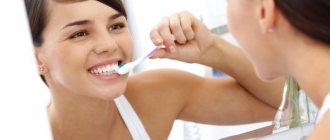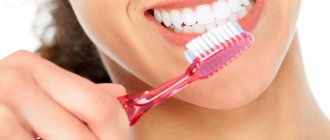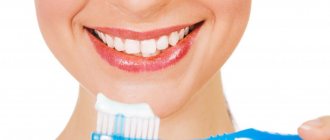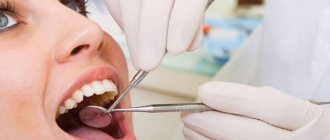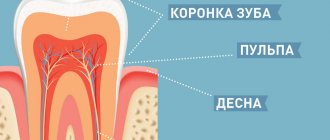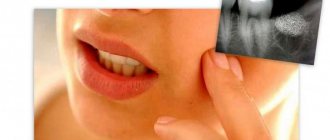Why should you brush your baby teeth?
Many young mothers believe that brushing their baby teeth is not necessary because they will fall out anyway. However, decaying teeth are always pain, discomfort and a source of spread of pathogenic bacteria.
How to brush your teeth correctly
How often, what to use, and in what mode is it better to brush your teeth? Detailed instructions for children and adults.
In addition, the early habit of brushing teeth becomes natural for the child and will help him preserve the health of his molars.
How to brush your baby's teeth
The child needs to brush his teeth in the morning and evening, it is advisable to do this after each meal or at least give him some water. It is important to clean all surfaces of the tooth. It is more convenient for parents and baby to lie on their back. You can hang a toy above your head so that the child is not afraid and is distracted.
The cleaning process includes the following steps:
- You need to brush your first teeth very carefully so as not to scratch the gums, palate and enamel, or injure the inside of the oral cavity. Do not press too hard on the brush!
- The toothbrush is placed to the tooth at an angle of 45 degrees and sweeping movements are performed. In this case, they go from the gum to the edge of the tooth;
- Gentle rotational movements are used for the gums;
- In the process, both the inner and outer surfaces of each tooth are cleaned;
- Two to three minutes are enough for cleaning.
Don't forget to clean your tongue with boiled water and gauze. You can take a soda solution. This will help remove plaque. If plaque persists, this indicates problems with digestion or the onset of thrush. See a doctor immediately!
When does a baby's first teeth appear?
The first teeth - the central incisors - appear in the baby at the age of 6-8 months . First they erupt on the lower jaw, then on the upper.
By the age of one year, the child has four more lateral incisors, and the baby celebrates his first birthday with eight teeth.
Sometimes the first teeth erupt later, this may be a variant of the norm. “But just in case, at the age of six months the child should be shown to the dentist,” advises Kuzmina.
Should a child under one year old need to brush their teeth?
There is an opinion that baby teeth do not need care. Young mothers are wondering whether a child under one year old should brush their teeth? The answer will be - of course, yes!
Prevention of oral diseases in infants under one year of age includes:
- visiting the dentist;
- healthy eating;
- Regular brushing of teeth using suitable hygiene products.
The need for teeth cleaning in infants is due to the following:
- Low mineralization of the first teeth - at 4-6 months, temporary teeth erupt, which absorb the necessary microelements throughout the year.
- Infant formulas and complementary foods contain carbohydrates, and microorganisms are always present in the oral cavity.
In the presence of these factors, a carious process occurs.
You can start brushing your baby’s teeth without the help of special products. You can use a gauze bandage to clean the gums and first teeth. To do this, you need to make a tampon, moisten it in boiled water and wipe the mouth.
When teeth appear or gingivitis erupts, the tampon can be moistened with a decoction of medicinal herbs. Chamomile, oak bark, sage, lemon balm, and St. John's wort have many beneficial properties and will not harm the baby. It is recommended to carry out such care in the initial stages, then it is better to use special hygiene products.
How are the first teeth cut?
Teaching your child the rules of personal hygiene
Children are taught hygiene procedures from the first days of life. Find out how to teach your child to practice personal hygiene on his own.
The main symptoms of teething in infants are increased salivation and swelling of the gums. The process is usually uncomfortable for the child and may be accompanied by increased moodiness and crying for no reason, insomnia and loss of appetite.
A slight increase in temperature (up to 38°C) may be a natural protective reaction of the body, but in this case the child should be shown to a doctor.
You can help the baby a little. Buy several teethers - rubber or plastic toys for the child to bite on. Chewing rings with liquid inside, which are first placed in the refrigerator to cool, has a particularly soothing effect.
Additional methods : Gently massage the baby's gums with a gauze pad soaked in cold water, or use baby teething gels with anesthetics, which the pediatrician will recommend.
How to properly brush your baby’s teeth: dentist’s advice
From a very young age, your child should be taught to brush their teeth correctly. The procedure should be carried out 2 times a day: after breakfast and before bedtime. Brushing your teeth should take 2-3 minutes, but for children you can do the procedure faster. It is important to correctly explain the rules of hygiene:
- hold the brush at an angle of 45 degrees to the teeth;
- brush your teeth on all sides one at a time;
- carry out “sweeping” movements on the inner and outer surfaces;
- Make circular movements on the chewing surface;
- Clean the tongue with the back of the brush (if there is a rough surface for the tongue).
To interest your baby in the process, you can put a mirror in front of him and teach him to practice independent hygiene. The mother should brush her own teeth, and the child should brush his own. After brushing the mouth, praise your baby.
We invite you to familiarize yourself with Caring for children’s first teeth: teaching your child about oral hygiene
What foods are good for your first teeth?
Foods rich in calcium . First of all, it is cottage cheese and hard cheese. Slightly less calcium is found in milk, fermented milk products, green leafy vegetables, gooseberries, currants, and cherries. Sources of vitamin D, without which calcium cannot be absorbed, are egg yolk and butter.
You should include carbohydrate foods in your child’s diet less often: bread, potatoes, and especially sugar and sweet foods. Sweets provoke the active proliferation of bacteria in the mouth, which leads to early caries .
“The longer you don’t offer your child sweets, the better,” says Kuznetsova, “for example, children under three years old should not be given chocolate at all.”
How to care for baby teeth?
From the moment the first baby teeth appear (6-8 months) , and up to a year, parents should brush the child’s teeth with a special silicone brush placed on a finger at least once a day.
From the age of one year, a child can brush his teeth twice a day with a very soft children's toothbrush, moving from the gums to the cutting edge or chewing surface of the teeth.
From 2-2.5 years old, children's gel toothpaste should be used. The amount of paste per cleaning should not exceed the size of a pea.
From the age of 3, children's teeth are brushed twice a day with a very soft toothbrush and children's toothpaste.
From the age of 2–3 years , a child can be taught to brush his teeth independently under the mandatory supervision of his parents.
Caring for your first teeth
A child will be able to brush his teeth on his own only when he has mastered the skill of confidently using a toothbrush. This skill is usually acquired by age two. But this does not mean at all that you need to wait and do nothing until 2 years! Proper care of the first teeth should begin with the appearance of the baby's first milk tooth.
At about 6–7 months of age, the 2 lower middle incisors usually erupt. The joyful moments associated with the appearance of the first tooth are behind us, the silver spoon has, as expected, knocked, and now it’s time to take care of the health of temporary teeth, because the health of baby teeth is invaluable for a growing body!
Milk teeth play an important role in the functioning of the gastrointestinal tract; everyone probably knows their function - to chew food well for perfect digestion. In addition, their presence is necessary for articulation - clear pronunciation of sounds. And unexpectedly appearing caries may in the future affect the condition of permanent, molar teeth, which will replace the temporary ones. Therefore, until the child reaches 6–7 years of age, when baby teeth begin to fall out, one must not be lazy and try to regularly care for the oral cavity. And you must agree, a smile with white teeth is attractive - the first natural adornment of a funny baby, who is specially made to laugh in order to capture the smiling creature as a memory.
The very first care for baby teeth will not consist of brushing with a toothbrush and toothpaste, as we are used to, but of delicately rubbing the teeth and gums. There is an accessible device for this in every home. Look in your medicine cabinet for gauze or a bandage; it’s ideal if everything is sterile. Soak a small piece of cotton wool, gauze or bandage in boiled water, squeeze it out and gently treat the teeth, at the same time massaging the gums where other teeth have begun to emerge. How to fold a gauze swab or bandage is up to everyone to decide for themselves. It is convenient for one to handle it while holding it in the hand, while others wrap it around their finger. Try different ways and choose the one that suits you. By the way, finger pads are available for sale. They are worn on the finger and are used to clean the first teeth. Made of hypoallergenic rubber with silicone bristles. You can use this option for brushing your teeth from 3 months to 2 years. Many people liked these brushes. But some still use the “old-fashioned” method. There are no advisers in this matter, and only through practice can you figure out what is right for you and your baby in order to more carefully care for the first teeth.
Now let’s talk about how many times a day children under one year old should brush their baby teeth. Once is enough, preferably in the evening. And when the baby grows up to 1.5–2 years old, you can switch to 2-time cleaning. However, at the age of 2, such an important matter can already be entrusted to the child himself. Initially, you should teach your child to rinse his mouth after every meal. It’s great if your baby can gargle; this skill will come in handy when his throat hurts. You should brush your teeth with vertical movements for 2–5 minutes. Choose a brush with soft bristles, and choose a toothpaste suitable for the age of the child.
Watch your child carefully as they brush their teeth. Help him, watch how much paste is applied to the brush. Since, due to their small age, children can swallow toothpaste when brushing their baby teeth, it will be best if the baby brushes his teeth without it at first. In future, apply a pea-sized amount of paste. And as the little one grows up, the ability to brush teeth, spit toothpaste, and rinse the mouth will become stronger. As you age, you can increase the amount of toothpaste, but not by much.
Teach your child how to care for a toothbrush. Do not reward actions when your child throws a brush in the sink. Make it clear that the brush needs to be rinsed and placed, handle down, in a glass or other place designated for this purpose. It is advisable that children's toothbrushes be stored separately from adults. It is ideal if the baby sees himself in the mirror. He will see for himself whether he has washed all the paste off his lips and chin. This approach will turn the monotonous brushing of teeth into an exciting activity.
It is very important to set your baby up for a positive perception of oral care. After all, how responsibly a little person will treat this procedure will determine his attitude towards dental care in the future. It is important to create a comfortable environment for the baby and monitor his reactions. If you are upset and indignant, it would be better to stop and postpone caring for your first teeth for a while, perhaps even for a week or two, so that the child can forget the negativity associated with caring for his teeth.
Important! Since children tend to copy the actions of adults, a visual aid on how adults care for their teeth will be an educational lesson. But if you connect emotions, like this, for example, is pleasant and fresh, then there will be no such demonstration of price.
To keep your child’s teeth healthy, your baby’s diet must include foods containing phosphorus, calcium, zinc, vitamins A and D (milk, cottage cheese, liver, eggs, honey, tea, buckwheat porridge, fish oil, butter, etc.) , vitamin C (fresh fruits, vegetables and juices). Sweets should be limited, but if not, then make sure that after each candy, chocolate, etc. you eat. the child rinsed his mouth or simply drank water, thereby washing away the remaining sugar from the tooth enamel. And don’t forget to visit the dentist at least 2 times a year!
Choosing a brush and toothpaste for your baby
How to choose a toothbrush
Conventional, electric or ultrasonic? Soft or hard? Synthetic or natural? Accurate answers to all questions.
A baby toothbrush looks like this. It has a short working part - from 18 to 25 mm. Until the age of five, a child has a brush with very soft (extra soft) synthetic bristles, and from a later age - with soft bristles with rounded ends.
The handle of the children's brush is thicker, with non-slip inserts - this makes it easier for the baby to hold it.
Children's toothpastes are also different from adults. They are low in abrasives, low in fluoride, and contain fruity fragrances and flavors. Look carefully at what age of children this or that toothpaste is intended for.
Which toothpaste and brush should I choose for my child’s first teeth?
First you need a brush that is much smaller than an adult one. The surface of the fleecy part is no more than 25 mm. The first brush needs to have very soft bristles. Then, at about the age of 5 years, change from very soft to just soft. The handle of the toothbrush is thicker with various inserts so that it does not slip in the hand and is convenient for the child to grasp. Pastes for children's teeth also differ from adults - they do not contain solid particles, a small amount of fluoride, and flavoring additives. It is better for a child to buy toothpaste that is appropriate for his age. It is necessary to take your baby to the dentist for the first time when he has baby teeth. Sweets are very harmful for baby teeth, but if you brush them with a special brush every day, the effect will be very noticeable.
